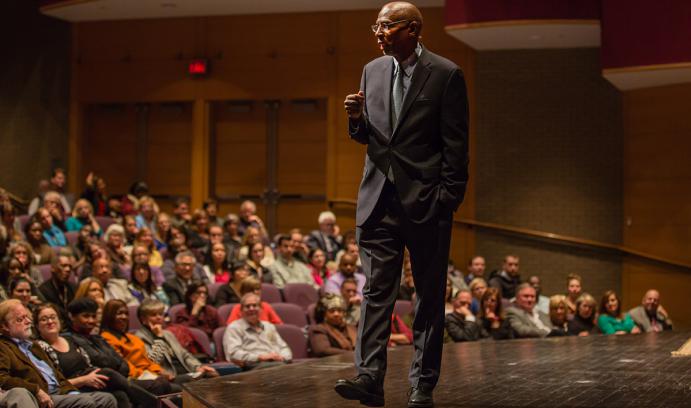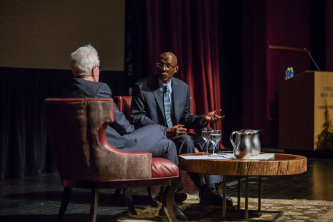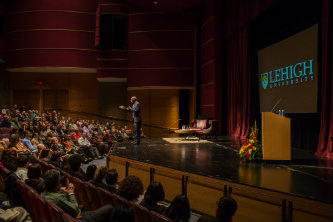‘Are we prepared to experiment?’

Geoffrey Canada touts education reform in an appearance at Lehigh that was part of the College of Education's Distinguished Lecture Series.
Educator Geoffrey Canada, who rose to national prominence as the head of the Harlem Children’s Zone, acknowledged in a well-attended appearance at Lehigh’s Zoellner Arts Center that he is outspoken and controversial, but he made no apologies.
“If you really care about these issues,” said Canada, an advocate for the disadvantaged, “you’ve got to be prepared to sometimes do things that create controversy.”
Canada spoke on “The Promise of Charter Schools” Tuesday, Nov. 10, as part of the College of Education’s Distinguished Lecture Series. In the College’s quest to find common ground in the polarizing debate over school reform, Canada continued a dialogue that began earlier this year with a presentation by education historian Diane Ravitch, a staunch advocate of public education.
“This is not about whether charter schools are the answer,” said Canada, pacing the stage in Baker Hall. “There are charters that are great. There are charters that are lousy. This is about, as educators, are we prepared to experiment, figure out what works, then scale it? That’s what this is. And charters should be the perfect vehicle to do that.”
A charismatic figure, Canada led the Harlem Children’s Zone for 25 years, a program The New York Times Magazine dubbed “one of the most ambitious social experiments of our time.” Drawing on his own experiences growing up, Canada targeted 97 blocks in central Harlem and designed programs to provide educational and social support to children at every stage of their lives. He stepped down as the Zone’s chief executive officer in 2014 but remains as president.
“I’m an educator. That’s all I ever cared about,” said Canada. “And the group I care about the most are the most disadvantaged people in this country….It’s the group I grew up with. It’s the group I watched be destroyed. I watched a whole generation of kids, my friends, destroyed.”
Canada said he believes that people should go as far as their talent and determination takes them. But poor kids often face obstacles that interfere with their education, such as having to contend with violence in their neighborhoods, he said.
“Are you going to focus on calculus, or how you’re going to stay alive at 14?” he asked. “See, some things aren’t fair.”
After resisting advice to pursue a career in medicine, Canada said, he decided to dedicate his life to figuring out how to help disadvantaged kids learn and “make it.” While not ignoring the realities of their lives, he said, he doesn’t believe those obstacles should be an excuse for not setting high standards and for not preparing poor kids to achieve at high levels.
To wide applause, he also spoke of the importance of education as a field of study. “I will tell you, if there’s any place in America that needs the most talented and gifted, it is in our schools,” he said. “And people just don’t get this connection.”
With a mix of humor and seriousness, Canada talked about his efforts in establishing the Harlem Children’s Zone and in working to improve the educational outcomes for disadvantaged students. The Zone takes a holistic approach, with programs that help children and their families from birth to college. He acknowledged that the programming is not cheap and that he has raised a lot of money for the Zone, but he said it has been essential.
“There is not a time in a child’s life that is the most important time,” said Canada. When initially told it was unrealistic to develop programs for every stage of development, Canada said he pressed on, asking those more privileged what they expected for their own children. “What is it that we think poor kids can do without, what period of time?” he said he’d ask in discussions about pre-school, middle school and other educational programs. “You know the most critical time of a child’s life? Today.”
The Harlem Children’s Zone also sets one expectation for its students—to attend college, not a trade school. Despite having been told he’s an elitist and that his standards are too high, Canada said no one shows surprise when top private schools set similar expectations for their students.
“What do we believe as a people? What do we believe?” Canada asked. “Do we believe…some kids are innately better? Why is it so outrageous for me to have a set of high standards for my kids, and people think that is elitist, when other people [in privileged circles] have standards that no one blinks an eye. So I believe if you work with other people’s kids, you should have the same expectations for those kids as you have for your own kids.”
Canada drew laughter when he told the audience that only two of his own three children went to college. “If you have three kids,” he said, “one of them is not going to do the right thing.”
So far, the Zone has served more than 13,000 children and more than 13,000 adults. And, Canada said, 1,000 children have gone on to college, with many returning to work in the Zone. Now the younger students are growing up around people who have gone to college, so it becomes more of the norm.
“What’s the story a kid has when he looks out the window?” he asked. “Is that story about violence and drugs and gangs, or college and graduate school and great jobs? We think it ought to be the second story.”
Canada was featured in the 2010 documentary Waiting for ‘Superman’ and has appeared on Oprah Winfrey Show and 60 Minutes. Also, drawing on his own childhood experiences and those at the Zone, he wrote Fist Stick Knife Gun: A Personal History of Violence in America and Reaching Up for Manhood: Transforming the Lives of Boys in America.
“I believe teaching is a profession, and there’s a science to it,” he said. “And I don’t believe that everybody can teach. If you’re a teacher and you can’t teach, you should probably find another job. People find that very controversial, there you go again, knocking teachers….If I say that if you’re a hairdresser and you can’t do hair, of course you do another job.”
When teachers can’t “cut it” in public schools in middle-class communities, “you can get rid of them,” he said, referring to job transfers. “Guess where they end up going? My community.”
Canada also took aim at failing public schools, pointing specifically to the South Bronx school district, considered one of the worst school districts in New York City because of low test scores. The situation, he said, has been unchanged for decades, with scores of children affected. But in that time, he said, there’s been no penalty for failure. The school day still starts and ends at the same time and classes are still taught the same way, he said.
“Say I want to start a different type of school?” he said. “People are ready to rake you over the coals. How dare you? What are you trying to do, upset the education structure in this country?”
Canada said everyone has to be accountable, not just teachers.
“The poor kids in this country, this is their life,” he said. “They’re not going to get an inheritance. No one’s going to leave them anything in their will that’s going to change it. They’re either going to get an education and make it or not. So my theory is, let’s try some stuff.”
In a question-and-answer-period that followed with Gary Sasso, dean of the College of Education, Canada said that in poorer communities, part of educators’ missions will be to bring resources into their schools. He said he recognizes that it’s unfair that some schools have resources and others do not. But while he believes that states should provide adequate funding, he said, the way that educators will level the playing field will be to figure out how to raise the money their schools need and to form partnerships.
“Quality education costs money,” he said. “It really does.”
Photos by Christa Neu
Posted on:



